Recently, I was watching my guilty pleasure The Masked Singer and playing along the fun game of guessing what celebrity is behind each mask. There was one contestant, ‘the Macaw’, whom the judge Nicole Scherzinger deduced was ‘a member of the LGBTQ community’. This isn’t the first time this has happened on the show, as there have been several times over the years that a rainbow is shown as a clue and ‘member of the LGBTQ community’ is guessed by the judges.
‘Macaw’ made it to the finals and was (spoiler alert, who cares) correctly determined by Sherlock Scherzy to be David Archuleta, the sweet American Idol alumnus. As on Idol, he came in second place. When unmasked, as sometimes follows on these types of programs, Archuleta gave a mini-speech about his ‘journey’. I don’t doubt it was heartfelt, as the singer has gone through some difficult years both pre- and post-Idol, due to his upbringing in a Mormon family. He spoke of his recent ‘coming out’, referring to himself as ‘queer’.
The audience and judges wept and applauded.
Not once on the program did anyone utter the word ‘gay’.
I don’t fault The Masked Singer show or judges for inaccuracy—it was Archuleta himself who did indeed ‘come out as LGBTQ’—but I question why a young gay man would choose to use these words rather than simply saying ‘gay’. Why are a generation of young homosexual men and women choosing this word instead of ‘gay’?
In the article linked above, Archuleta describes coming to grips with the fact that he ‘likes guys’ and how he had been engaged to three different women, but each time the relationship didn’t work out because ‘he knew something was wrong’.
David, honey. There’s a reason those relationships with women didn’t work out, and there’s a word to describe it. You’re gay. Just say gay.
Part of getting older means not understanding what the hell young people are thinking nowadays, but I do try. I get the hesitance with not immediately embracing ‘gay’ and all the baggage that comes with it. In my coming out time (the early 90’s), it was fashionable to announce you were bisexual—a sort of stepping out of the closet halfway. We talked ourselves into this belief, because it felt safer—not as threatening to friends, and not as life-altering to ourselves. So many of us performed this farce. And then a year or so went by, our friends got used to the change, we had a few same-sex dalliances, and we admitted, yeah, I’m just totally GAY. (LOL!, if texting had existed then.)
But why, of all things, embrace the ugliness of ‘queer’? It’s baffling how ‘queer’—to a legion of us old-timers, a slur—became fashionable. And even more baffling, how the people who have chosen this as their identity will angrily fight for the right to use it.
As an argument, the ‘queer’ people will say they ‘reclaimed’ the word. They give the ‘evidence’ of ‘We’re here! We’re queer!’ being shouted at Pride marches decades ago.
For one thing: It was never claimed as an ‘identity’, so it’s not yours to reclaim. As for the Pride chant: It was chosen because, oh, I dunno—IT FUCKING RHYMED. It was punchy and attention-getting. (And by the way, the complete chorus as I recall it was: ‘We’re here! We’re queer! We’re faaabulous! Get used to it!’)
Like ACT UP and Queer Nation, it was meant as a defiant middle finger to the government ignoring the AIDS crisis. It was a call to arms and a warning to gay-bashers. It was a shock to get the public to clutch their collective pearls. It was a sneer—‘Oh, you think I’m queer? I’ll show you how queer I can be’—born out of anger and frustration during a very difficult time for gay people. It was never meant as an ‘identity’ to check off on an Internet survey or dating profile.
With the social acceptance gained over the past few decades, and the legal triumph of same-sex marriages, the appropriateness for the word’s use has passed.
Or should have. But The Powers That Be had a trick up their sleeves. Sometime in the 2000’s, after adding T to LGB, they added another new letter—‘Q, for Questioning!’ they said. ‘For people unsure and not ready to fully come out.’
Sure, we naively shrugged. I guess that’s nice. We don’t want to force anyone who’s not ready to come out…
The next thing you know, the Q in LGBTQ was doing double duty, standing for both ‘Questioning’ and ‘Queer’. It didn’t take long for “Questioning’ to wither away and die—who questions himself anymore? Everyone is so certain nowadays—and the Q morphed into ‘Queer’ entirely.
Then those assholes at GLAAD made it ‘official’, giving their full-throated endorsement of Queer. Thus opening the door for anyone to join ‘the community’. Literally: anyone. Seriously: ANYONE.
So many problems with this, but here is the biggest one: You don’t strengthen a minority by artificially inflating its numbers. The goal of Gay Pride (before it became Pride™) was not to get AS MANY MEMBERS AS WE POSSIBLY CAN, it was for the small number of us gay men and lesbians to say we just didn’t want to be treated like second class citizens anymore.
“Why does it bother you?” people ask.
Because the hypocrites who rant and scream about the ‘Don’t Say Gay bills’ are the ones who have stopped saying the word ‘gay’. They have used our pain for political power—in the service of grooming and indoctrinating children—while simultaneously dismissing us.
Because it recategorizes me with a group of posers I do not care to be associated with. If ‘LGBTQ+’ blurred the lines, ‘queer’ erases the lines completely. It creates a completely false category of people. A heterosexual man who wears nail polish and an occasional skirt has nothing in common with the struggle I went through as a gay person. I don’t want them speaking for me as if we are part of the same community.
Because it’s gay erasure. Many of us were forced out of the closet—we didn’t do so willingly. Speaking for my generation, I don’t think you can grasp how difficult it was to say those words “I’m gay”. It’s why they put Ellen’s simple statement on the cover of Time. Those three little words were revolutionary. Just making that declaration, using that word, was a big deal.
For people to take that word GAY away is so hurtful. Like it never mattered. For young gay people to reject it is downright depressing.
To add insult to injury, false versions of ‘coming out’ are celebrated. It’s embarrassingly easy to come out as queer…all you have to do is say so. Whatever your version means is valid.
The evidence is all around us: the ‘queers’ have swiftly destroyed the progress the gay rights movement took decades to gain.
After successfully extending ‘gay rights’ to ‘LGBTQ+’ rights, it’s apparent to me the next goal is erasing ‘gay’ entirely and replacing it with ‘queer’, the catch-all word that places no restrictions whatsoever. Wait for the announcement from GLAAD, under the banner of ‘Inclusiveness’.
Soon it will be June and Pride Month will once again rear its ugly head. Because I’m a glutton for punishment, I went to my local Target to see what monstrosities they’re peddling this year. A friend had clued me in that she was there and saw a T-shirt with ‘QUEER QUEER QUEER QUEER’ on it. She said she had stared at it and thought, “I don’t remember ever seeing ‘GAY GAY GAY GAY’ on shirts for Pride Month.” I had to go see for myself.
If this isn’t gay erasure, what is?
Do they really think this is progress? Do the young gay men and women look at this and feel…proud?
The only point you’re making by calling yourself ‘queer’ is either to show that you’re faking it to be part of a club, or you have deep-seated internal homophobia.
There is no pride in being ‘queer’. Like this merchandise, it’s ugly, aggressive, and obnoxious. It will only ever represent hatred and fear.

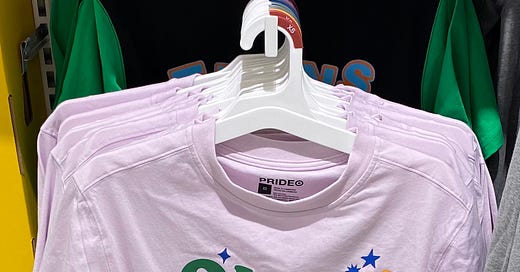


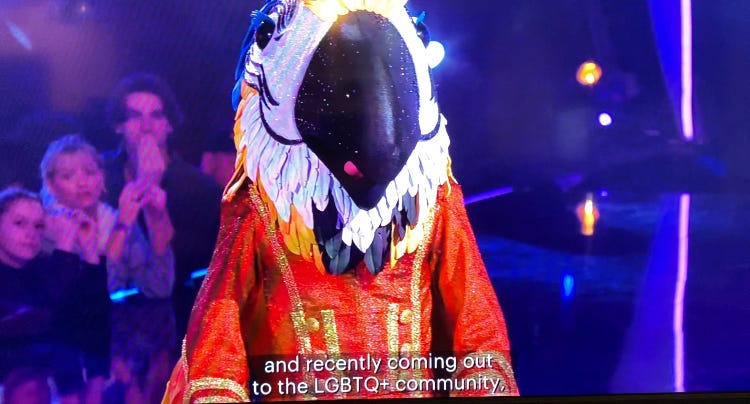
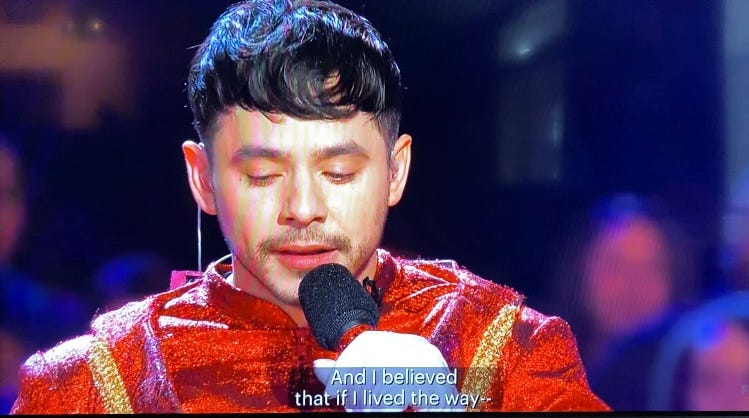

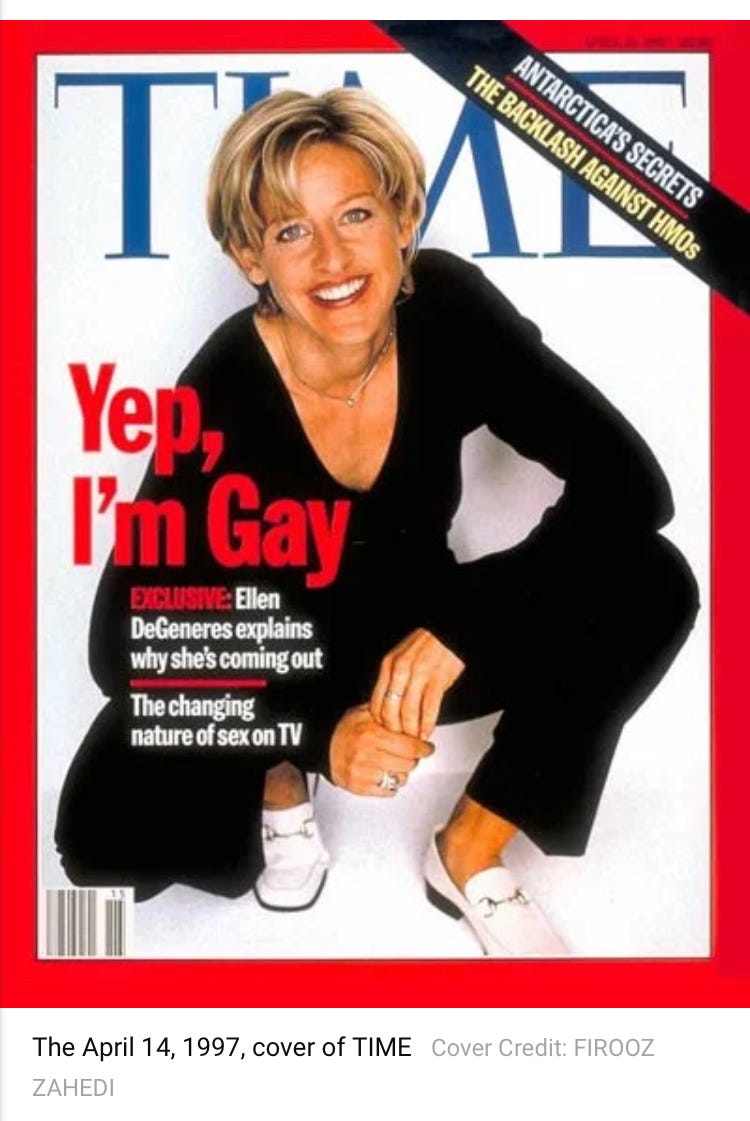
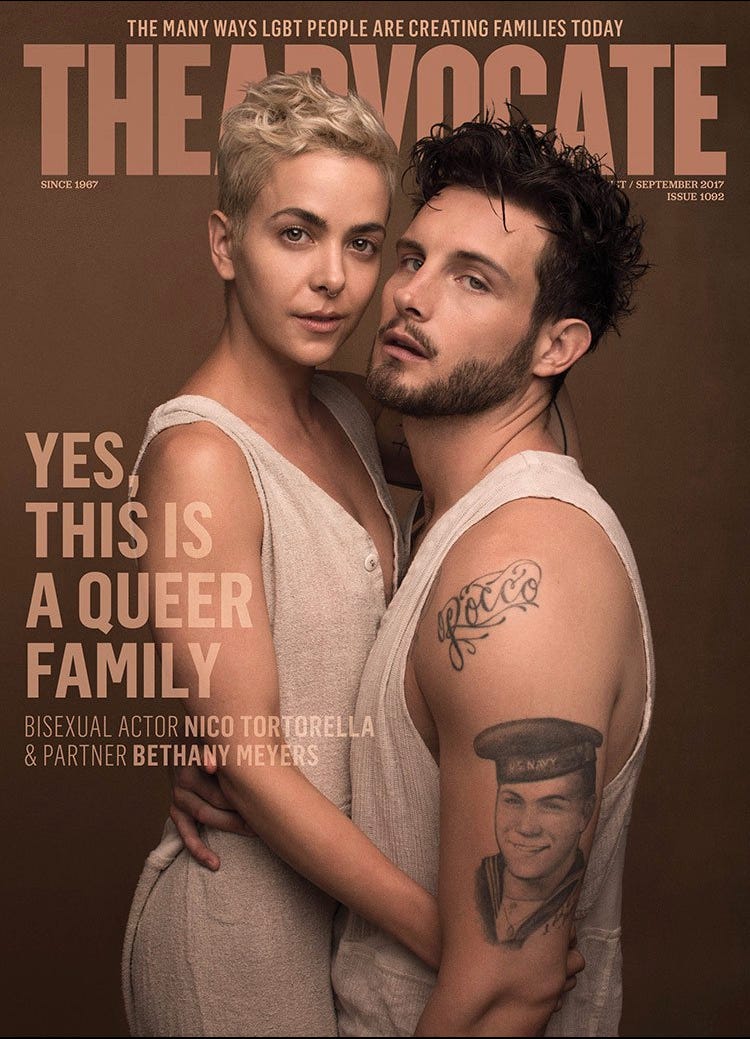


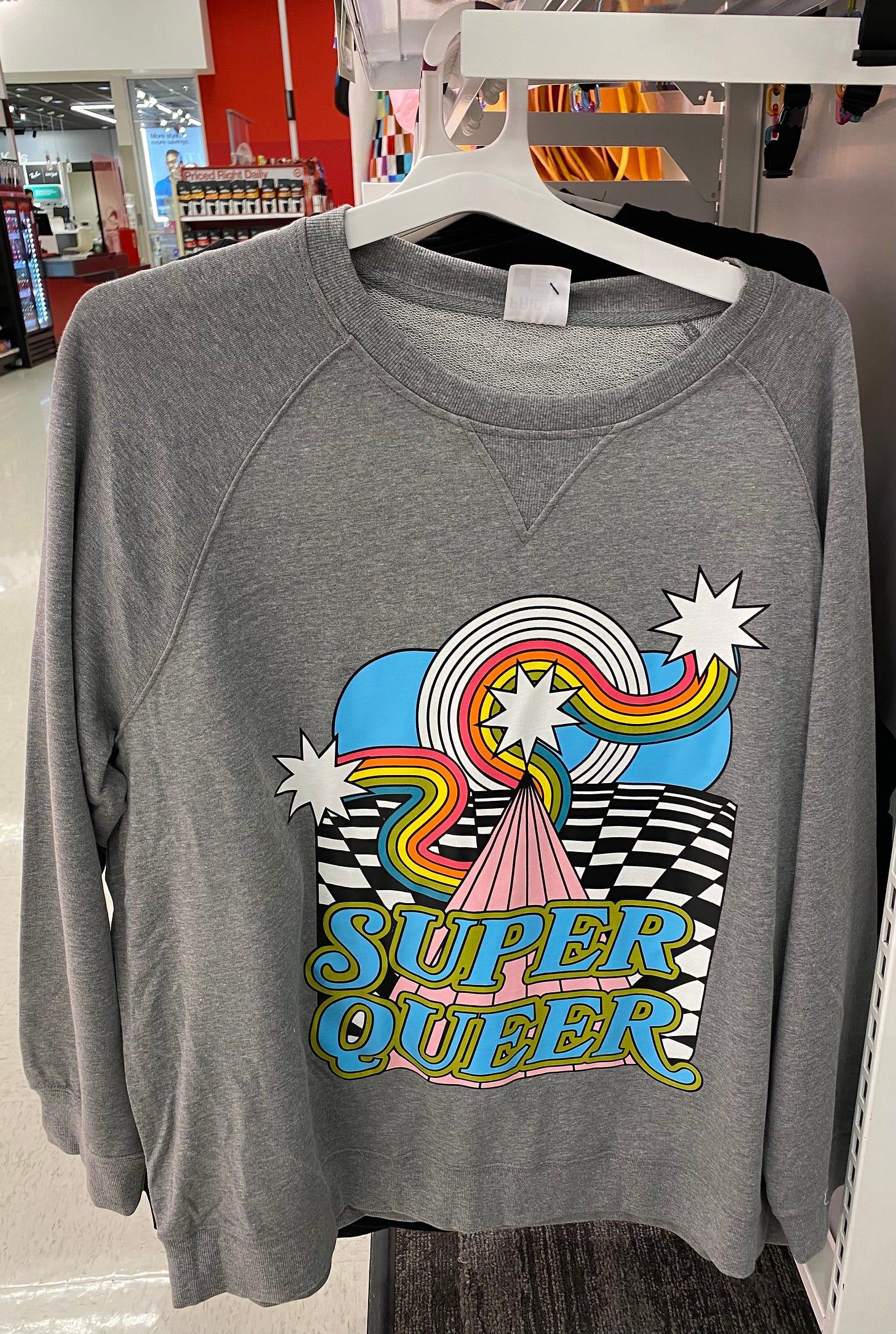
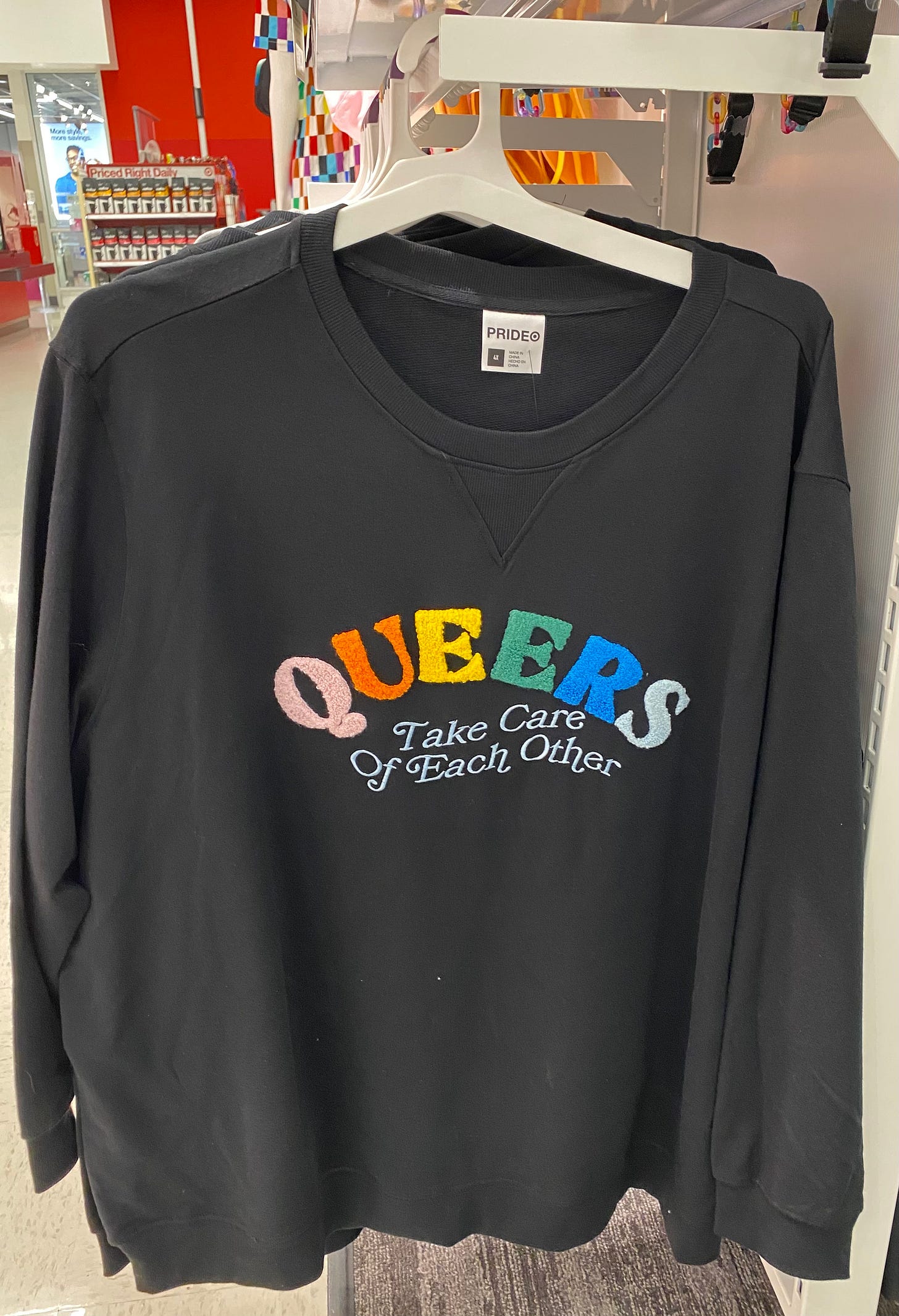
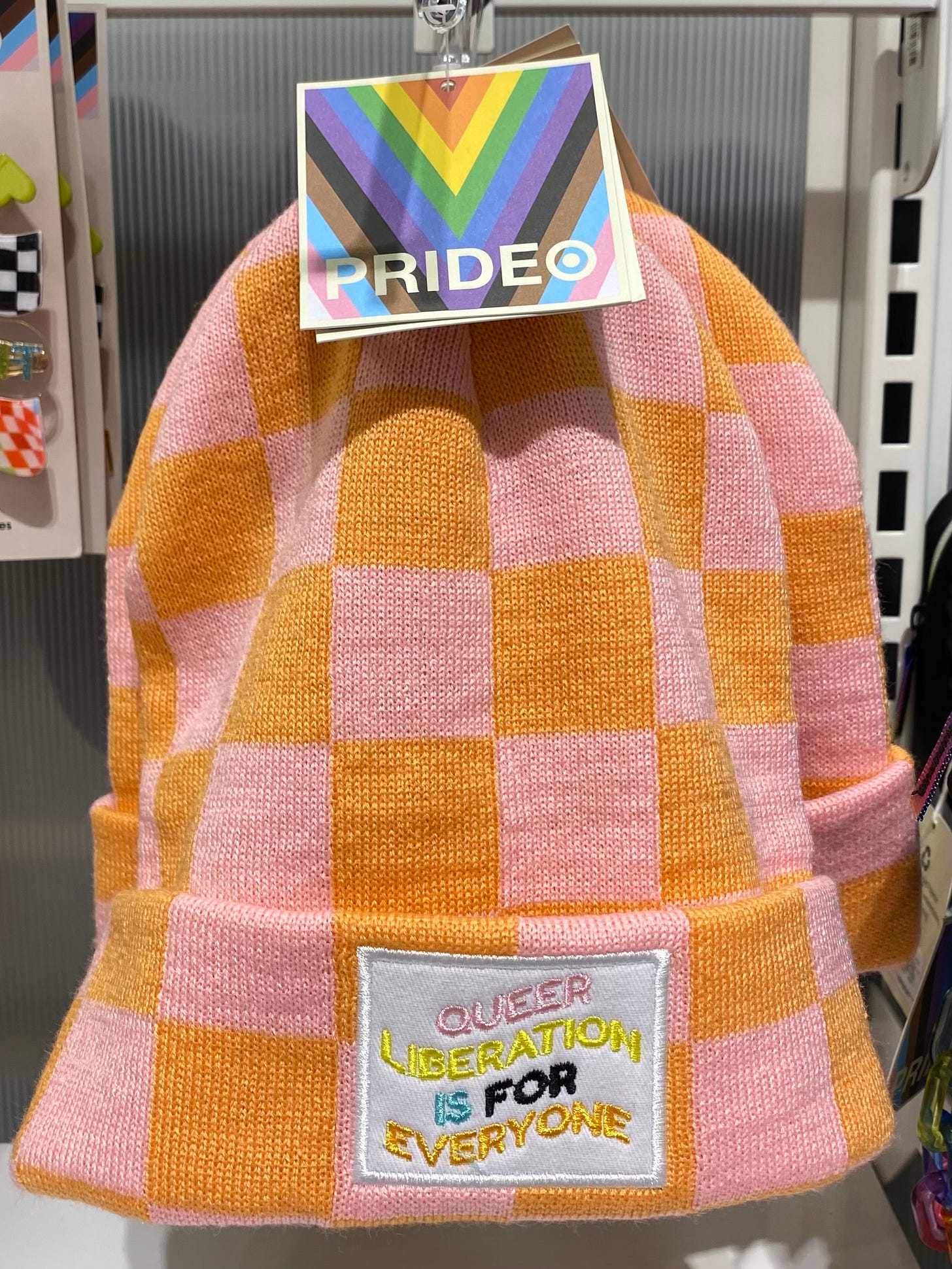
Every time I feel like going to the lesbian bar to meet my friends, and then remember that there are no lesbian bars anymore because they’ve been appropriated by, ahem, queers, I have a little meltdown of sadness and rage.
You’re right on the money, as usual, Gary. Very well analyzed and expressed.
In solidarity,
B.
I just saw that t-shirt at Target! And I thought to myself: can you imagine seeing a t-shirt at Target that says "Lesbian" (even once?)
No, you cannot. Because being gay or lesbian is as invisible and disliked as ever. Being a straight person with an interesting hair color though--I mean, a "queer"--is fashionable. And we care about who's fashionable, not who's gone through an authentic struggle.